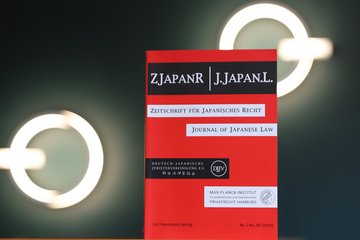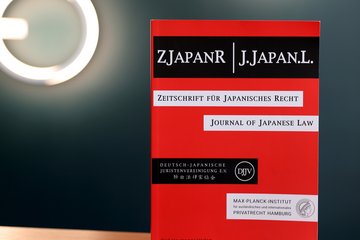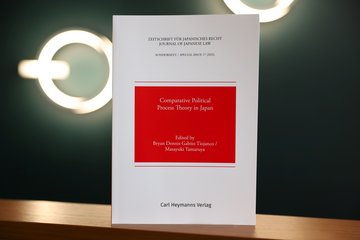
The Centre of Excellence for Japan: Legal research keeping step with Japan’s economic, social and political development

The Centre of Excellence for Japan at the Max Planck Institute for Comparative and International Private Law is one the most important contact points for legal questions regarding Japanese civil, commercial and economic law. Towards this end, Prof. Dr. Harald Baum, founder and leader of the Centre, undertakes comparative research that intensely examines Japanese law and other foreign legal systems. He is joined in these efforts by assisting staff member Anna Katharina Suzuki-Klasen.
Why is comparative research regarding Japanese law so important?
Harald Baum: ”In a few short decades Japan established itself as a global leader and one of the world’s most important economic powers, and it is today one of Asian’s leading nations. The continuing importance of Japan and, correspondingly, its law cannot be doubted. Moreover, Japan is the only Asian country that has long possessed a modern, smooth-functioning, western-influenced legal system; now more than a century old, it has for decades been embedded in a democratically constituted society. The influence of Japanese law on other East Asian countries has been and continues to be significant.“
Japan and Germany have enjoyed a friendly and historically unburdened relationship for more than 150 years. What does this mean for your research?

Harald Baum: ”It should be recalled that there is also a long history of scholarly legal exchange between Japan and Germany. The German BGB influenced the Japanese Civil Code in many areas. Inversely, interest in Japanese law within Germany is steadily growing. The tradition of exchange warrants further cultivation.
Further, legal cooperation also facilitates the intensification of German engagement in the Asian region. This is a prerequisite if we wish to respond to the future challenges posed by an Asia of continually increasing political and economic importance. Not incorrectly, the 21st century is often referred to as the ”Asian“ century.“
Recently published:
see also: Private Autonomy and Personal Responsibility – A German-Japanese Comparative Study
What makes research on Japanese law exciting?
Harald Baum: ”For comparative scholars, it is always particularly exciting to study countries or regions where laws deriving from different traditions come together. In this sense, it is especially intriguing that modern Japanese law is a “mixed-law” system reflecting the influence of various legal regimes, particularly those of Europe and the USA. Thus, I am studying a legal system which has incorporated legal rules of western influence into its own distinct cultural and social setting. Accordingly, Japanese law – despite its undeniably modern nature – can be genuinely studied only if the cultural, anthropological, social, economic and political aspects are also taken into account. This complexity is compelling for researchers.“

Anna Katharina Suzuki-Klasen: ”Comparative analysis allows a researcher to more effectively identify the paths and legal solutions presented by a foreign system. As a hybrid legal system that has been shaped by diverse – especially western – legal traditions, Japanese civil law is particularly well suited for comparison with European legal systems. In my doctoral project I am considering the rules governing the conclusion of a contract in English, German, and Japanese private law. We find, for instance, that the effectiveness of a contract in Japanese law is, despite the substantial influence of the BGB, by no means dependent on compliance with legal formalities. In business transactions, a party’s personal seal takes precedence over a hand-written signature. Here, a conception of law shaped by traditional Japanese notions is quite evident. Finally, it is especially fascinating to observe Japanese legal traditions being combined with various western concepts and then developed further.“
How do international researchers and legal practitioners access information regarding developments in Japanese law and satisfy the increasing interest in Japanese law?
Harald Baum: ”As regards comparative research in respect of Japan, one of the Institute’s most important tasks is the creation of a platform providing reliable information on Japanese law in western languages. This has been achieved with the conception, realisation and international anchoring of the “Zeitschrift für Japanisches Recht / Journal of Japanese Law”, in publication since 1996. It stands as the world’s only western-language legal periodical offering regular and timely analysis of the myriad developments in Japanese law.“
Harald Baum is professor at the University of Hamburg, coordinator of the academic exchange between the University of Kyoto and the Max Planck Institute for Private Law and member of the academic advisory board of the Interdisciplinary Centre for East Asian Studies (IZO) at the Goethe University Frankfurt.
Among other activities, he serves as vice-president of the German-Japanese Association of Jurists, member of the advisory board of the Australian Network of Japanese Law (ANJeL), research associate of the European Corporate Governance Institute in Brussels and member of the German Society of International Law. He is founding editor of the “Zeitschrift für Japanisches Recht / Journal of Japanese Law.”
















